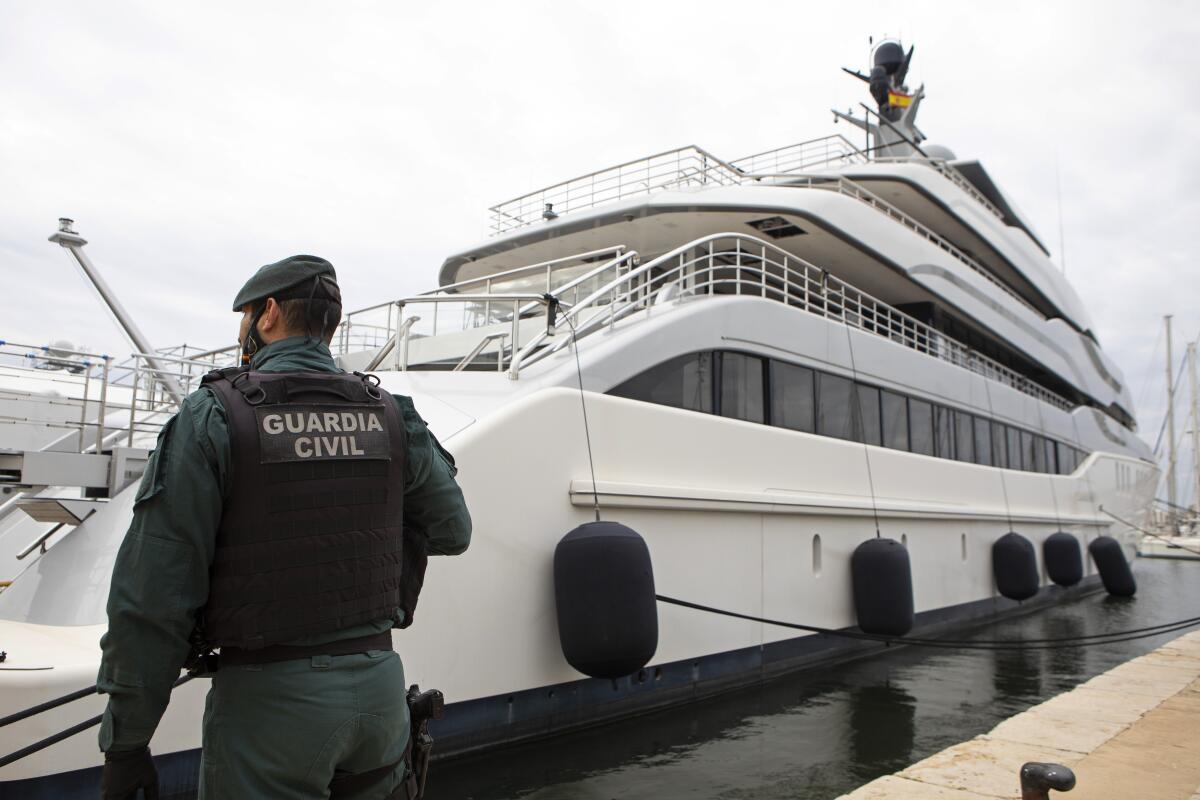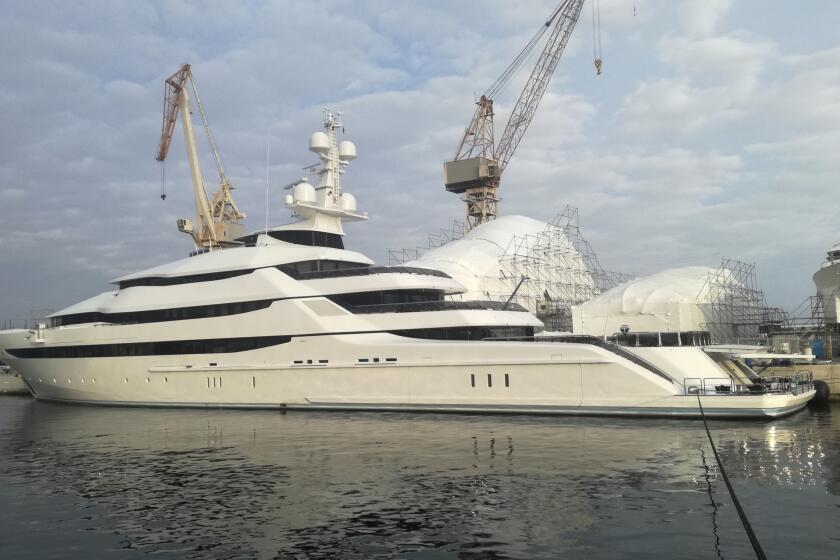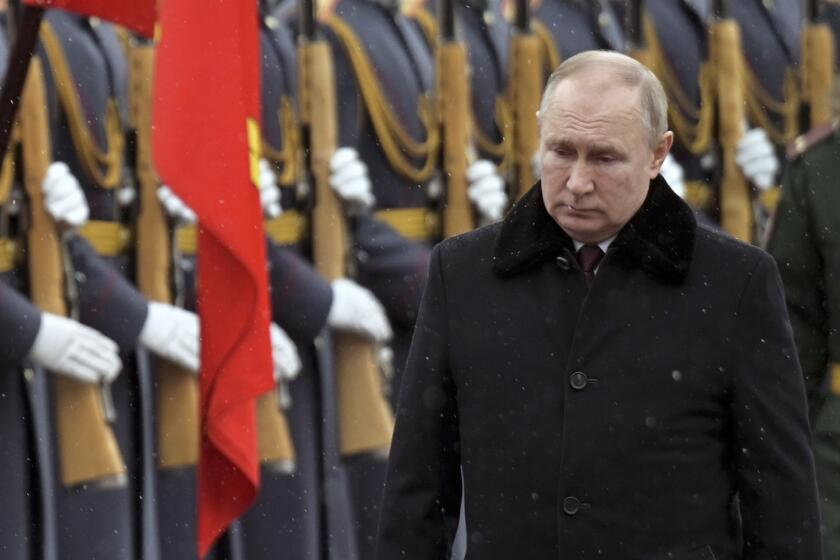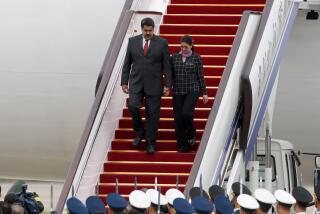U.S. seizes large yacht in Spain owned by oligarch with close ties to Putin

- Share via
PALMA DE MALLORCA, Spain — The U.S. government Monday seized a mega-yacht in Spain owned by an oligarch with close ties to Russian President Vladimir Putin — the first vessel to be taken under Washington’s sanctions effort to “seize and freeze” giant boats and other pricey assets belonging to Russian elites.
Spain’s Civil Guard and U.S. federal agents descended on the yacht at the Marina Real in the port of Palma de Mallorca, the capital of Spain’s Balearic Islands in the Mediterranean Sea. Associated Press reporters at the scene saw police going in and out of the boat Monday morning.
The joint operation to seize the yacht, by Spain’s Civil Guard, the FBI and Homeland Security Investigations, was carried out at the request of U.S. authorities, the Civil Guard said.
A Civil Guard source told the Associated Press that the seized yacht is the Tango, a 254-foot vessel that carries a Cook Islands flag and that Superyachtfan.com, a website that tracks the world’s largest and most exclusive recreational boats, values at $120 million. The source was not authorized to be named in media reports and spoke to AP on condition of anonymity.
The yacht is among the assets linked to Viktor Vekselberg, a billionaire and close Putin ally who heads the Moscow-based Renova Group, a conglomerate encompassing metals, mining, tech and other assets, according to U.S. Treasury Department documents. All of Vekselberg’s assets in the U.S. are frozen, and U.S. companies are forbidden from doing business with him and his entities.
While Vekselberg has not been sanctioned by the European Union, he is under investigation in the U.S. for possible tax fraud, money laundering and falsifying documents precisely to hide the ownership of the yacht, the Civil Guard said in a statement.
A sanctions regime aimed at putting pressure on Russia’s wealthiest citizens has put a spotlight on the global mega-yacht trade.
The move is the first time the U.S. government has seized an oligarch’s yacht since Atty. Gen. Merrick Garland and Treasury Secretary Janet L. Yellen assembled a task force known as REPO — short for Russian Elites, Proxies and Oligarchs — to enforce sanctions after Russia invaded Ukraine in late February.
Vekselberg has long had ties to the U.S., including a green card he once held and homes in New York and Connecticut. The Ukrainian-born businessman built his fortune by investing in the aluminum and oil industries in the post-Soviet era.
Vekselberg was also questioned during special counsel Robert S. Mueller III’s investigation into Russian interference in the 2016 U.S. presidential election and has worked closely with his American cousin, Andrew Intrater, who heads the New York investment management firm Columbus Nova.
Vekselberg and Intrater were thrust into the spotlight in the Mueller probe after the attorney for adult film star Stormy Daniels released a memo claiming that $500,000 in hush money was routed through Columbus Nova to a shell company set up by former President Trump’s personal attorney, Michael Cohen. Columbus Nova denied that Vekselberg played any role in its payments to Cohen.
The Russian president is believed to be very wealthy, but his assets are in the name of relatives, associates and friendly oligarchs.
Vekselberg and Intrater met with Cohen at Trump Tower, one of several meetings between members of Trump’s inner circle and high-level Russians during the 2016 campaign and transition.
The 64-year-old Vekselberg founded Renova Group more than three decades ago. The group holds the largest stake in United Co. Rusal, Russia’s biggest aluminum producer, among other investments.
Vekselberg was first sanctioned by the U.S. in 2018 and again last month, shortly after the invasion of Ukraine began. Vekselberg has also been sanctioned by Britain.
The yacht sails under a Cook Islands flag and is owned by a company that is registered in the British Virgin Islands and administered by different societies in Panama, the Civil Guard said, “following a complicated financial and societal web to conceal its truthful ownership.”
Record foreign currency reserves, low debt and digital currencies have given Russia room to maneuver despite sanctions. But will China lend a hand?
Agents confiscated documents and computers inside the yacht that will be analyzed to confirm the real identity of the owner, the Civil Guard said.
The White House has said that many allied countries, including German, Britain, France, Italy and others are involved in trying to collect and share information about Russians targeted for sanctions. In his State of the Union address, President Biden warned oligarchs that the U.S. and its European allies would “find and seize your yachts, your luxury apartments, your private jets.”
“We are coming for your ill-begotten gains,” he said.
Monday’s capture is not the first time Spanish authorities have been involved in the seizure of a Russian oligarch’s yacht. Officials previously said that they had seized a vessel valued at more than $140 million and owned by a close Putin ally who runs a state defense conglomerate.
Breaking News
Get breaking news, investigations, analysis and more signature journalism from the Los Angeles Times in your inbox.
You may occasionally receive promotional content from the Los Angeles Times.
French authorities have also seized super-yachts, including one believed to belong to Igor Sechin, a Putin ally who runs Russian oil giant Rosneft, which has been on the U.S. sanctions list since Russia annexed Crimea in 2014.
Italy has also seized several yachts and other assets.
Italian financial police moved quickly to seize the super-yacht Lena, which belongs to Gennady Timchenko, an oligarch close to Putin, in the port of San Remo; the 215-foot Lady M, owned by Alexei Mordashov in nearby Imperia, featuring six suites and estimated to be worth $71.5 million; as well as villas in Tuscany and Como, according to government officials.
More to Read
Sign up for Essential California
The most important California stories and recommendations in your inbox every morning.
You may occasionally receive promotional content from the Los Angeles Times.












